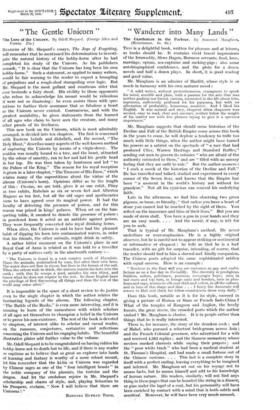cc .-.7y wanderer into Many Lands
5 9
The Gentleman in the Parlour. By Somerset Maughtun4 (Heinemann. 8s. ed.)
Tins- is a delightful book, written for pleasure and at leisure; as books should be. It contains vivid travel impressions of the Irrawaddy, Shwe Dagon, Burmese servants, food, love, marriage, opium, sea-captains and sucking-pigs ; also some autobiographical confidences, and the plots for a dozen novels and half a dozen plays. In short, it is good reading and good value.
Mr. Maugham is an admirer of Hazlitt, whose style is so much in harmony with his own maturer mood : " A solid writer, without pretentiousness, courageous to speak his mind, sensible and plain, with a passion for the arts that was neither gushing nor forced, various, interested in the life about him, ingenious, sufficiently profound for his purposes, but with no affectation of profundity, humorous, sensitive. And I liked his English. It was natural and racy, eloquent when eloquence was needed, easy to read, clear and succinct, neither below the weight of his matter nor with fine phrases trying to give it a specious importance."
Mr. Maugham suggests that should some historian of the Decline and Fall of the British Empire come across this book in the years to come, he will deplore a tendency to trifle too much with little things, when the author might have turned his powers as a satirist on the spectacle of " a race that had produced Clive, Warren Hastings and Stamford Rallies,". sending out men to govern its colonies " who are afraid of the authority entrusted to them," and are " filled with an uneasy feeling that they are unfit to rule." But the author answers " I cock a snook at the historian of the Decline and Fall.". He has travelled and talked, studied and experienced in every corner of the Seven Seas, and knows that the Empire has been " a moment in the world's history not without its. grandeur." Not all his cynicism can conceal his underlying faith.
Late in the afternoon, we find him observing two green pigeons, so tame, so friendly, " that unless you have a heart of stone you cannot but be touched by the sight of them. You reflect on the innocence and bliss of their lives." But you are made of stern stuff. You have a gun in your hands and they are an easy mark. . . . And the moral, if any, is left for you to seek.
That is typical of Mr. Maugham's method. He never underlines or over-emphasizes. He is a highly original observer, but lie is careful not to appear striking or sentimental or informative or eloquent : he tells us that he is a bad traveller, with no gift for surprise, intending, of course, that the reader should find in him a shrewd and kindly companion. The Chinese poets adopted the same sophisticated artifice with equal success. Here is an example :
" Nowhere in the East will you see costumes so gay and multi- farious as on a fine day in Piccadilly. The diversity is prodigious. Soldiers, sailors, policemen, postmen, messenger boys ; men in tail coats and top hats, in lounge suits and bowlers, men in plus. fours and caps, women in silk and cloth and velvet, in all the colours, and in hats of this shape and that . . . I fancy the Annamite will return to Hue and think his fellow-countrymen dress very dully."
Does this book, notable as it is for its style, succeed in giving a picture of Burma or Siam or French Indo-China ? What of the temples of Rangoon and Angkor, the lovely forests, the great rivers, the crowded ports which the author visited ? Mr. Maugham is elusive. It is in people rather than things that he is really interested.
There is, for instance, the story of the drunken cook ; and of Mabel, who pursued a reluctant bridegroom across Asia ; and the French Colonial governor, who advertised for a wife and received 4,365 replies ; and the Siamese monastery whose novices smoked cheroots while saying their prayers ; and the " poor white trash " who had been a medical student at St. Thomas's Hospital, and had made a small fortune out of the Chinese customs.. . . This last is a complete story itself with a perfect ending, leaving everything to be imagined
and inferred. Mr. Maugham set out on his voyage not to amass facts, but to amuse himself and add to his knowledge of human nature. His readers, similarly, will not find any. thing in these pages that can be hoarded like string in a drawer, or pins under the lapel of a coat, but his personality will have been enriched by contact with a mind that is both subtle and senaitivi. Moreover, he will have been-very much amused. -


















































 Previous page
Previous page